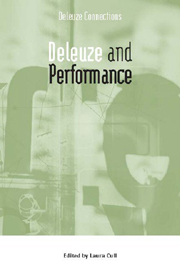Book contents
- Frontmatter
- Contents
- Introduction
- 1 Performing in the Chaosmos: Farts, Follicles, Mathematics and Delirium in Deleuze
- Act I Deleuze on Theatre: Artaud, Beckett and Carmelo Bene
- 2 I Artaud BwO: The Uses of Artaud's To have done with the judgement of god
- 3 Expression and Affect in Kleist, Beckett and Deleuze
- 4 A Theatre of Subtractive Extinction: Bene Without Deleuze
- Interval
- Act II Confronting Deleuze and Live Performance
- Interval
- Act III A Digital Deleuze: Performance and New Media
- Notes on Contributors
- Index
2 - I Artaud BwO: The Uses of Artaud's To have done with the judgement of god
from Act I Deleuze on Theatre: Artaud, Beckett and Carmelo Bene
Published online by Cambridge University Press: 12 September 2012
- Frontmatter
- Contents
- Introduction
- 1 Performing in the Chaosmos: Farts, Follicles, Mathematics and Delirium in Deleuze
- Act I Deleuze on Theatre: Artaud, Beckett and Carmelo Bene
- 2 I Artaud BwO: The Uses of Artaud's To have done with the judgement of god
- 3 Expression and Affect in Kleist, Beckett and Deleuze
- 4 A Theatre of Subtractive Extinction: Bene Without Deleuze
- Interval
- Act II Confronting Deleuze and Live Performance
- Interval
- Act III A Digital Deleuze: Performance and New Media
- Notes on Contributors
- Index
Summary
I, Antonin Artaud, am my son, my father, my mother, and myself … I don't believe in father or mother, don't have papa-mama.
(OC XII: 65, 70)For I am the father-mother, neither father nor mother, neither man nor woman, I've always been here, always been body, always been man.
(OC XIV**: 60)These fragments taken from late Artaud texts, Ci-Gît (Here lies) and Suppôts et suppliciations (Henchmen and torturings), written in 1946 and 1947 respectively, represent a singular version of the twentieth-century avant-garde contestation of the world as it appears to be. They represent the artist claiming the right to be the author of himself, to create a more authentic version of the self. They have also become familiar for readers of Deleuze and Guattari's own avant-garde adventure throughout the two volumes of Capitalisme et schizophrénie: L'anti-Oedipe and its sequel Mille Plateaux. Artaud's apparent acknowledgement and denial (disavowal) of the Oedipal law resonates powerfully with the anti-Oedipal themes of these works. It is a theme he returns to in the later writings:
Between the body and the body there is nothing, nothing but me. It is not a state, not an object, not a mind, not a fact, even less the void of a being, absolutely nothing of a spirit, or of a mind, not a body, it is the intransplantable me. But not an ego, I don't have one. I don't have an ego … what I am is without differentiation nor possible opposition, it is the absolute intrusion of my body, everywhere.
(OC XIV**: 76)- Type
- Chapter
- Information
- Deleuze and Performance , pp. 37 - 53Publisher: Edinburgh University PressPrint publication year: 2009



